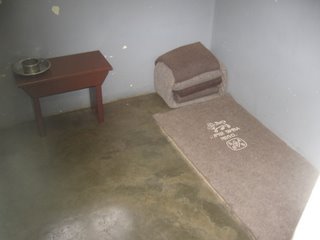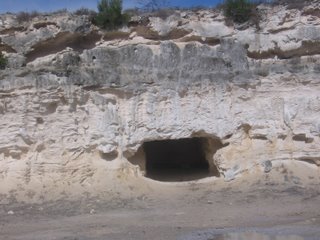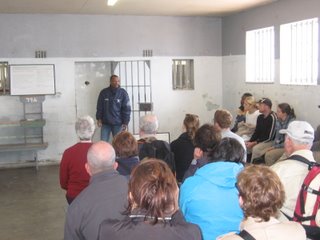Never, and Never Again.

One of the highlights of my Cape Town trip was definitely Robben Island. Ever since I was in my early teens, and beginning to have my political consciousness awakened by the events going on in the world, I have been interested in the symbol of Robben Island and how it represents one of the worst forms of systematic racism in human history. South Africa’s Apartheid State required the authorities to be able to arrest any and all political dissidents and make them disappear from the rest of society. For nearly 30 years, the greatest leaders of the African National Congress, and other political activists that fought against the massive injustices of Apartheid, were cut off from their beloved land and housed in the harsh conditions of Robben Island’s maximum security prison. The cell you see below was the home of Nelson Mandela for nearly twenty years as he lived out his sentence and dreamed of a South Africa free from racial discrimination.

The tour of the island was very powerful, beginning with the 20 minute boat ride over to the island. Robben Island has served as a place of banishment for the British and the Dutch for hundreds of years. It used to be a home for insubordinates of the colonial government and the local African leaders who refused to give in to the demands of the European authorities. During the 1800s it was used as a leper colony by an Irish mission and during WWII it housed artillery and the batteries for the Allied forces in South Africa. The maximum security prison was only built in 1960 under the order of the National party and the first political prisoners began arriving to the island in 1961-1962. As I sat in my comfortable chair on the boat ride over I could not help but think about all the others that have crossed Table Bay in much more deplorable conditions, destined for existence of shame and exile. I got a similar feeling when I toured Alcatraz in San Francisco. Walking in the steps of prisoners, as a tourist with a camera in my hand, can be quite a surreal experience.

The tour of the island revealed a whole “community” that had been built up around the jail. We were shown the countless sports fields built by the black prisoners for the exclusive use of the white guards. We were also shown the limestone quarry that the prisoners worked in five days a week using only pick axes and buckets. They would spend one week moving the rocks into a giant pile then spend the next week moving that pile to another location in the quarry…continuing this monotonous process for months on end. The hole that you see above is particularly interesting because it was one of the only places of privacy afforded to the prisoners. Here was where they could go to the bathroom and eat their meager lunches, although the location served a more important purpose in allowing the prisoners the opportunity to share ideas and discuss political events. Many of the former prisoners call this hole the “University of Robben Island” as it provided the opportunity for younger prisoners to be educated by the senior leaders of the anti-apartheid movement. The conversations held within that hole had an indelible impact on the forces that helped to bring down the apartheid state in 1994.

What was also incredibly fascinating about Robben Island is that all tours of the prison are conducted by former inmates. I was expecting someone as old and grey as Mandela himself but was pleasantly surprised to have Samuel, a guide in his late 30s who had spend five years at Robben Island from 1986-1991. Samuel was an absolute wealth of information, providing us with a no-holds barred, honest account of life in the jail. Despite being incarcerated for much of the prime of his life, Samuel did not display any anger or resentment towards his former guards or rest of South Africans. Samuel strongly believes in moving forward with a progressive vision of a new South Africa, one in which people of all races and creeds and claim equal ownership and live together harmoniously. This progressive spirit is evident in many of the Robben Island staff, where former prisoners and guards live side by side to preserve the island as a symbol of both South Africa’s dark history and bright future. It was truly an inspirational experience to be a part of Robben Island and see the power of the human spirit triumph over the forces of evil.
.
"Never, and never again shall it be that this beautiful land shall ever experience oppression of one by another"
- Nelson R Mandela 1994





3 Comments:
great post!
I agree. Very informitave JP!
Wow that's amazing! Thanks Jared! It's great to have you open my/our minds to so many amazing perspectives in this world.
merci
kj
Post a Comment
<< Home